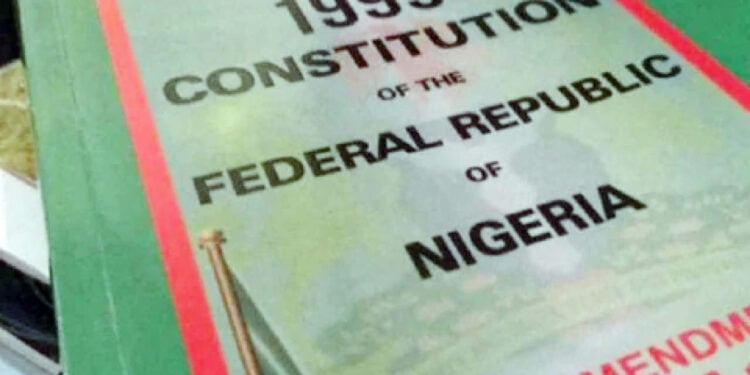The Association of Igbo Town Unions (ASITU) has kicked against the creation of new states in the country.
It described such efforts as misguided, unconstitutional and detrimental to the already fragile federation.
This was made known through a statement signed by the national president of ASITU, Chief Emeka Diwe,.
The association said Nigeria’s challenges cannot be addressed through cosmetic state creation, but by convening a Sovereign National Conference on the legitimacy of the 1999 Constitution.
They said, “The Association of Igbo Town Unions (ASITU), the voice of grassroots governance in Igboland, has closely followed the recent public hearings on the amendment of the 1999 Constitution organised by the National Assembly across the country.
“While we acknowledge the right of Nigerians to seek a better framework for national coexistence, we must, however, state unequivocally that the foundation upon which these efforts are being made is fundamentally flawed. The 1999 Constitution is not a people’s document. It is, in every respect, a legal fraud foisted on us by a departing military junta in 1998, without the consent, consultation, or participation of the Nigerian people. Any attempt to amend this document without first addressing its legitimacy is akin to building a house on sinking sand.
“In its opening declaration, the 1999 Constitution claims it was enacted by ‘We the People’. This is a blatant lie. The Nigerian people never debated, reviewed, or adopted this constitution. What we inherited on May 29, 1999, was an imposition: a product of military fiat drafted by a small committee handpicked by an authoritarian regime.
This unconstitutional foundation makes every amendment, no matter how noble, a patchwork on an illegitimate document. What Nigeria needs is not another round of constitutional amendments, but a genuine Sovereign National Conference where ethnic nationalities can freely deliberate and agree on the basis of their union.”
Chief Diwe stressed that the notion of a constitution, in every civilised society, is that it emerges from the people.
According to them, it is not the will of rulers, but the codification of a people’s collective decision on how they wish to live together, be governed, and relate with one another.
“This is how it works in true federal systems like the United States, where the constitution was the outcome of the 1787 Philadelphia Convention; an assembly of delegates from the original thirteen colonies, who freely debated and ratified their union. Likewise, in Switzerland, a multi-ethnic nation, the constitution was the result of negotiated agreements that allowed the cantons, each with unique languages, religions, and cultures, to coexist peacefully. These are examples Nigeria must study.
“Sadly, instead of embracing this path of popular sovereignty and negotiated union, what we now see is a misplaced enthusiasm for the creation of more states. The clamour for over thirty new states, as revealed during the public hearings, is deeply troubling. It betrays a failure to understand the true roots of Nigeria’s crisis. With over 36 states already in existence, and fewer than three of them economically viable without the monthly allocations from the federation account, the pursuit of additional states is akin to multiplying liabilities under a broken system. More states will not bring development; instead, they will deepen our fiscal distress and bureaucratic inefficiencies.
Chief Diwe submitted that Nigeria once had regions that enjoyed significant autonomy and controlled their resources.
“The Western Region, under Chief Obafemi Awolowo, introduced free education and built Africa’s first television station. The Eastern Region, under Dr Michael Okpara, was the fastest-growing economy in the Commonwealth. The North was famous for groundnut pyramids. These feats were possible because of true federalism that allowed regions to compete, innovate, and prosper. Since the Balkanization into states and the onset of centralised governance, we have seen a steady decline in our quality of life. Nigerians born in the 1960s enjoyed better healthcare, education, and infrastructure than those born in the 1970s. The downward trend continued until we got to the present situation, where feeding is a luxury for the vast majority of Nigerians. This is a tragic reversal.
The group stressed the irony that while Nigerian leaders parade around the globe, they refuse to emulate the democratic systems they admire.
“Countries that have succeeded in managing diversity and development, like Canada, Germany, and India, operate federal systems where subnational units have clear autonomy and powers in key areas like resource generation and allocation and security. India, despite having over 1.4 billion people and multiple languages and religions, continues to thrive because its states are constitutionally empowered to chart their paths within the union. Nigeria must learn from these best practices, not continue to recycle colonial centralism and overhang in a post-colonial nation.”
ASITU emphasised that they firmly believed that a sovereign national conference was the only path to a stable, prosperous, and united Nigeria.
“This conference must bring together representatives of all ethnic nationalities, not appointees of the government, to deliberate on whether and how they want to remain in a union. This gathering must be empowered to agree on the terms of coexistence and draft a new constitution that will truly reflect the will of the Nigerian people. Anything short of this will only recycle the dysfunctions we have lived with for decades.”
They called on all well-meaning Nigerians, civil society groups, ethnic organisations, religious institutions, and the international community to join this urgent call for Nigeria’s re-founding.
“A mere amendment of a document born in deception will not salvage a nation sinking in contradictions. Only a people-driven constitution, birthed in truth and consent, can pave the way for peace, justice, and equitable development in Nigeria.
“ASITU remains committed to the unity of Nigeria, but not at the expense of justice, truth, and mutual respect among its diverse peoples. We will continue to push for a Nigeria that works for everyone, a Nigeria that begins with the people and is owned by the people.”



